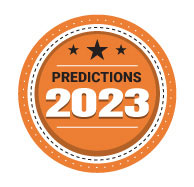
8 ed-tech trends to expect in 2023


 The Covid-19 pandemic accelerated the adoption of online education and we witnessed the many benefits and superior outcomes that integration of technology with education could reap. 2023 is likely to see a greater amalgamation of the latest technological developments with education, resulting in even more elevated learning experiences, outcomes, greater accessibility, inclusion and democratization of the learning experiences.
The Covid-19 pandemic accelerated the adoption of online education and we witnessed the many benefits and superior outcomes that integration of technology with education could reap. 2023 is likely to see a greater amalgamation of the latest technological developments with education, resulting in even more elevated learning experiences, outcomes, greater accessibility, inclusion and democratization of the learning experiences.
Here are some edtech trends we predict for 2023.
Hybrid learning models with the new normal including metaverse based experiences (XR)

Metaverse was quite the tech buzzword in the year 2022 and we are likely to hear a lot more of it in 2023. A 3D virtual world, where users can interact with each other and with computer-generated objects and avatars, metaverse has the potential to change how concepts are taught and learnt. Replicating the real-world scenarios in a safe environment will enable students to engage with the concepts in a deeper and more meaningful way. Imagine being able to conduct an advanced surgical procedure or fixing a high-voltage wire or conducting rescue operations during a natural calamity, but in a secure and regulated environment. A common thread of discontentment with traditional education has been the lack of its applicability in the real world. Metaverse, with its hands-on aspects, will be able to solve this problem and demonstrate how complex and diverse ideas can be applied to solve real-world problems.
Concept of Digital backpack which include your digital learning trail, evidence and projects
Equipping kids with a digital backpack, which will contain the tools, applications and resources they will need to learn and research, their learning trails, projects, assignments will make the learning experience smoother for both students and teachers, especially for online learners and those who can’t be present on campus. This will not only enable students to complete their assignments and projects from anywhere and at their preferred time but also help those with outdated laptops and other devices have access to the latest knowledge and tools without having to push the boat out.

Use of blockchain for credentials, CV and projects trail
Blockchain and the adoption of Web3 will make the entire process of verification seamless and more reliable, be it regarding dubious certificates, references mentioned on a CV, projects undertaken and more.
Microcredentials and achievement tracking

Greater focus on learning outcomes is likely to set in motion a movement away from the traditional systems of evaluation such as degrees or diplomas. We are likely to witness educational institutes - both online and offline, offering micro-credentials or mini-qualifications that will demonstrate a student’s skill set, knowledge or experience in a given subject of study, focussing on application and not just theory.
Community contribution and impact on learning
Integration of technologies such as Web3 with education will enable students and learners across the globe to transcend the limitations of a centralised system of education and connect with teachers, experts and professionals from anywhere at any time. People who wish to learn or upskill themselves will no longer be limited by their physical, geographical or financial constraints.

Special education needs
In 2023, we can expect technology to play a greater role in helping children with special learning needs. Assistive technologies, audio and visual aids, speech-recognition software’s, text-to-speech software and physical aids to become more accessible and cost-effective. AR/VR to be used more widely to simplify and demonstrate concepts for those with special learning needs.
Learning behaviour and style analysis for personalization

Big data analytics and machine learning algorithms can be used to identify, track and analyse learning patterns and behaviours in kids and create personalised lessons and study plans that will be able to tap and enhance their innate learning capabilities without them feeling overwhelmed.
White Hat gamification
As we witness a change in the traditional system of evaluation, we are also likely to observe a change in the way kids are rewarded for their performance. Incorporation of White Hat gamification techniques such as leveling up or unlocking a specific achievement at every stage/level of learning will keep the child engaged and motivated for longer durations. They are likely to feel a sense of accomplishment and wish to outshine their previous performance with each passing level. Use of games, riddles and puzzles to deliver the educational content is also likely to boost engagement and enhance learning outcomes.


Ravi Bhushan
Ravi Bhushan is the Founder and CEO of BrightCHAMPS.
